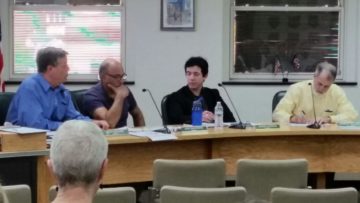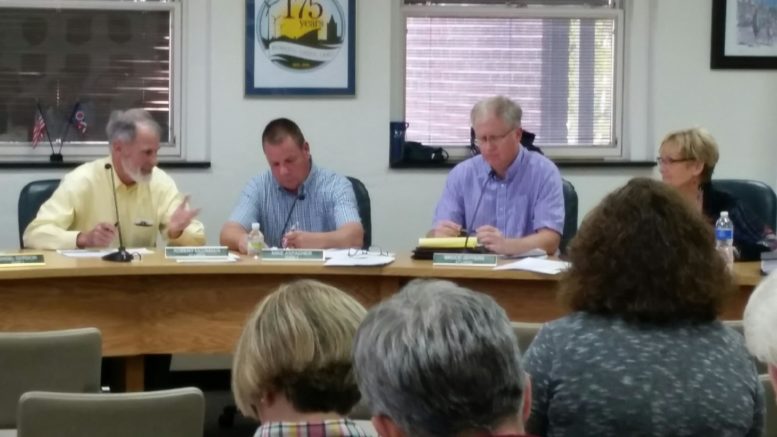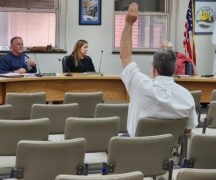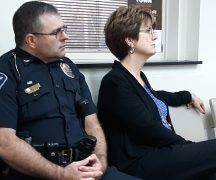By JAN LARSON McLAUGHLIN
BG Independent News
It’s rare for Bowling Green City Council to use movie quotes to explain city predicaments. But on Monday, dialogue from the movie “Argo” just seemed to fit the options being considered to help the city’s general fund recover, according to council member Bob McOmber.
“We only have bad options available,” McOmber said.
That set the scene for the Committee of the Whole’s job Monday evening. The council members were tasked with narrowing down the bad options to the best of the bad for building the city’s general fund back up after federal and state funding cuts.
Nine options were presented Monday evening. Four were eliminated after getting very little support from council members. Those dropped from the list were:
- Raising the city income tax.
- Cutting police and/or fire divisions.
- Cutting the city arborist.
- Eliminating tax reciprocity.
That leaves five options still on the list:
- Redistribute the city income tax.
- Privatize city trash collection.
- Continue offering city trash collection, but charge a fee.
- Charge an assessment for tree services.
- Reduce city funds that are assisting other entities.
The budget for 2017 lists revenue of $14,996,197 and appropriations of $15,623,253 – which means it is cutting into the balance by $627,056, and is not sustainable. The losses seen in the general fund are ongoing, so while the shortfall in this year’s budget has been identified as $627,056, the structural deficit is actually more – closer to $800,000 or $1 million a year.
Raising the city’s 2 percent income tax rate got very weak support from council. McOmber said 2 percent is pretty standard for Ohio municipalities. Also with the current distribution system set by voters for the city’s income tax, the general fund would only get 37.5 cents of every $1 collected.
“That’s too much money going other places,” when the general fund is where it is needed, McOmber said.
“It won’t give us the bang for the buck we are looking at,” council president Mike Aspacher said.
Members were also concerned about higher income taxes hurting the city in the long run. “I think it would definitely harm us in a negative way,” Sandy Rowland said.
Bruce Jeffers and Scott Seeliger saw the income tax increase as an option to consider. City officials have been frugal in their spending, and this would eliminate the need to cut services or move funds from other areas.
“To me, it is a viable option,” Jeffers said.
The quickest option to be rejected was the reduction in police and fire staffing.
“This is a non-starter for me,” Aspacher said. Public safety is the most vital of services provided to residents, he added. “I don’t think we can consider ourselves in a crisis situation.”
“It’s gone,” McOmber said of that option.

City Council’s Scott Seeliger, John Zanfardino, Daniel Gordon and Bob McOmber talks about options.
Next on chopping block was elimination of the city arborist position.
“I don’t like the option,” Jeffers said, followed by others.
“We’re in this mess because of actions by the state,” Daniel Gordon said. City staff who are “good financial stewards” should not suffer, he added.
The last option to get booted was the ending of tax reciprocity for Bowling Green residents who work outside the city.
McOmber said he disliked this option because it focused on a small number of people, rather than spreading the expense over a large section of the city’s population.
John Zanfardino spoke against it, since the city could lose population if residents “find one more reason to move to where they work.”
So that left five options for City Council to discuss more during a special meeting on June 5 at 6 p.m.
Redistribution of the city’s income tax revenue would require a vote by citizens. The income tax revenue, as voted on, is divided up between several different services in city government.
“It’s one option that doesn’t involve a direct additional charge” or change services immediately, McOmber said.
However, the shifting of revenue doesn’t come without pain – probably to the public utilities department which gets a larger portion of the revenue and which would likely see the biggest loss if the income is redistributed.
Utilities Director Brian O’Connell cautioned that water and sewer rates would have to be raised to make up for lost funding.
But McOmber said the possible 15 percent hike would add only $3 a month to the average residential customer’s $15 bill. “I wouldn’t even notice the difference unless somebody told me,” he said.
There would be no reduction in services, but it could hinder economic development in the city if the utilities department didn’t have the estimated $5 million a year for capital improvements.
Aspacher suggested that the board of public utilities be consulted about any possible cuts. “We need to be very cautious in altering that formula,” that has been very successful for the utilities department.
Cities that don’t have well funded utilities departments cannot serve their citizens well, Aspacher said. “Their utility infrastructure suffers because of it.”
Rowland agreed. “We don’t have to look very far north” to see the problems that arise from not investing enough in utilities, she said referring to Toledo.
“It’s not my favorite bad idea,” she said.
However, Jeffers, Gordon and Zanfardino expressed some interest in exploring the option further.
The next two options involved trash collection. The first calls for the privatization of garbage pickup, with the city selling its equipment and contracting with a private company which would then bill citizens.
“We’d be completely out of the trash business,” McOmber said.
Rowland said that during her recent campaigning, she heard many negative comments about privatizing trash pickup. “People overwhelmingly did not want privatization.” They are opposed to sending the money outside the city and having no control over rates, she added. “They like the way the city operates it.”
Seelinger also expressed some reservations. “I’m really leery of privatization.” A private contractor could go out of business, and the city would no longer have equipment to provide the service.
The other garbage option involved the city continuing to offer the service, but charging a monthly fee of about $12.40. Aspacher said research by city officials showed very few communities offer the service without a fee.
Gordon and Zanfardino preferred this option to privatization.
Jeffers pointed out that new fees would only target homeowners, since apartments already contract with private companies for pickup.
Aspacher suggested that city officials present more information on the garbage options prior to the next meeting. He also urged council members to give all the options consideration.
“We’ve got to keep an open mind,” he said.
Also considered is an assessment on property taxes to be used for tree care. Such an assessment is already being charged for street cleaning.
Seeliger said he favored “assessments over reductions in services.”
The last option on the list was reducing the amount of money the city provides to other entities. Those amounts include tax sharing with Plain and Center townships to compensate them for annexations, funding to the Wood County Airport, sharing of the hotel/motel tax with the Convention and Visitors Bureau, community fireworks, and economic development.
Aspacher said the amounts given to these groups are small to the city, but are significant to the organizations.
McOmber spoke out especially for the economic development funding. “That’s money well spent.”
And Rowland defended the items that add to quality of life. “I think these things add to making us a great community,” she said.
During the June 5 meeting, council may make its decision on how to alleviate the general fund distress. McOmber cautioned that putting an issue on the ballot should be considered carefully, with the realization that the school district is likely to have a tax issue on the ballot in November.





